|
|
|
Sort Order |
|
|
|
Items / Page
|
|
|
|
|
|
|
| Srl | Item |
| 1 |
ID:
147915
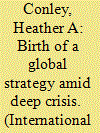

|
|
|
|
|
| Summary/Abstract |
The process of undertaking, developing and writing a strategic document is akin to a gestation and birthing process. First comes the excitement and enthusiasm of developing a new strategy; then patient and careful planning, consultation and waiting; and finally the difficult but ultimately satisfying process of writing and releasing the new strategy. Congratulations … it’s a bouncing 51-page EU Global Strategy! Sincere congratulations to Nathalie Tocci and the work of many talented individuals who produced the EUGS.
|
|
|
|
|
|
|
|
|
|
|
|
|
|
|
|
| 2 |
ID:
156091
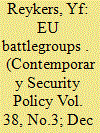

|
|
|
|
|
| Summary/Abstract |
This article reviews the gloomy saga of the EU Battlegroups, focusing on four questions: Where do they come from? What do they look like? What have they been hindered by? And where do they go from here? It builds upon earlier findings in the literature and adds novel insights based on original data. In doing so, the article pays particular attention to the standby nations’ constant calculation of political and financial costs. It argues that recognizing these cost–benefit calculations allows for identifying the most crucial areas to be tackled to make the EU Battlegroups functional. In addition, the article stresses that these considerations play out in a setting wherein the Battlegroups are just one among many policy instruments available for rapid response.
|
|
|
|
|
|
|
|
|
|
|
|
|
|
|
|
| 3 |
ID:
170609
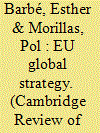

|
|
|
|
|
| Summary/Abstract |
The European Union (EU) has been portrayed as a force for good in the international system. However, due to systemic changes in the international environment and the crises of European integration, its role in the world is becoming more contentious. This paper applies the politicization literature to EU foreign policy and, using the case of the EU Global Strategy (EUGS), questions the effects of emerging politicization for EU political integration. The paper analyses how the EUGS has downscaled the transformative ambition of EU foreign policy, showcasing an adverse framing of its strategic narrative. However, it also argues that this narrative has been accompanied by more integrationist practices, as shown by the institutional developments during the making of the EUGS and its implementation in security and defence. The paper concludes that the effects of emerging politicization in EU foreign policy can simultaneously reflect a less transformative narrative but lead to more integrated practices and policies.
|
|
|
|
|
|
|
|
|
|
|
|
|
|
|
|
| 4 |
ID:
147925
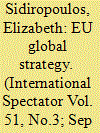

|
|
|
|
|
| Summary/Abstract |
Within days of a vote on an island off continental Europe that shocked the world, the release of the EU’s Global Strategy reflected a sober assessment of Europe’s position in the world, and provided an integrated vision for its international affairs at a time when the world is both complex and connected.
|
|
|
|
|
|
|
|
|
|
|
|
|
|
|
|
| 5 |
ID:
147931
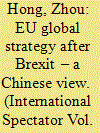

|
|
|
|
|
| Summary/Abstract |
The long-awaited European Union Global Strategy (EUGS) came out at a crucial time of a major geopolitical change: immediately after the Brexit referendum. The Brexit itself, as Nathalie Tocci stated, has hardly affected the content of the EUGS, although it has triggered a profound crisis in the EU. The principles and the positions of the EU at 27 should and shall remain basically the same as at 28. However, no one can deny that the Brexit can fundamentally reduce or change the capacity of the EU in fulfilling its global strategic goals. This was made very clear by Federica Mogherini, High Representative of the European Union for Foreign Affairs and Security Policy and Vice President of the Commission, in her speech to the Chinese Academy of Social Sciences, as well as in the words and lines of the EUGS.
|
|
|
|
|
|
|
|
|
|
|
|
|
|
|
|
| 6 |
ID:
148301
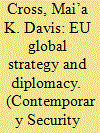

|
|
|
|
|
| Summary/Abstract |
The new EU Global Strategy has significant implications for EU diplomacy, in terms of both goals and means. This article first analyses the timing of the strategy as an exercise in diplomacy in its own right. Second, it argues that the strategy outlines a more expansive and noticeably more smart power-oriented approach to diplomacy in practical terms. Finally, it notes that the strategy has a new meta-narrative for EU diplomacy, which seeks to project a blend of both realistic assessment and idealistic aspiration.
|
|
|
|
|
|
|
|
|
|
|
|
|
|
|
|
| 7 |
ID:
148300
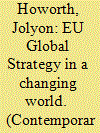

|
|
|
|
|
| Summary/Abstract |
The world is entering a period of power transition, at the outcome of which some new form of global order (or disorder) is likely to emerge. Critical to this process is the interaction between the established powers, the USA and the European Union (EU), and the emerging powers, particularly China, Brazil, India and Russia. Many analysts have classified the EU as a declining power, a perception that has been enhanced with the triple crises of sovereignty that have rocked the Union since the mid-2000s (money, borders and defence). In this context, the publication of the EU Global Strategy was an opportunity for the EU to state clearly the nature of its ongoing and future relations with the rest of the world. This article argues that, in reality, Europe as a bloc (as opposed to its member states severally) has very limited purchase with the other major powers, and an ambivalent or ill-defined grasp of how to engage with them. They, for their part, have difficulty in knowing how to understand the EU as an actor and prefer to deal bilaterally with its key member states.
|
|
|
|
|
|
|
|
|
|
|
|
|
|
|
|
| 8 |
ID:
154840
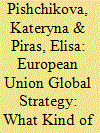

|
|
|
|
|
| Summary/Abstract |
Some dismiss the recent EU Global Strategy as a “triumph of hope over experience”, an impracticable and therefore ultimately irrelevant statement; others are enthusiastic about what they see as perseverance and renewed ambition in the face of the present crisis. Although the 2016 Strategy appears more modest than its 2003 predecessor in operational terms, the range of deliberations that fed into it and the quality of the document itself demonstrate a greater maturity of reflection on foreign policy. A critical reading of the document shows that concepts such as normative power and differentiated inclusion of neighbours in the EU’s system of governance have all but disappeared. The emerging EU identity appears to be debilitated by the centrifugal processes of internal contestation and a drastically downsized claim for external power projection. An alternative plan for action will have to deal with the Union’s vulnerabilities and carve out a role that is distinct, yet in line with this new self-understanding.
|
|
|
|
|
|
|
|
|
|
|
|
|
|
|
|
| 9 |
ID:
148299
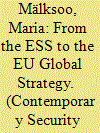

|
|
|
|
|
| Summary/Abstract |
Security strategies are important sites for narrating the EU into existence as a security actor. The unveiling of a new global strategy on foreign and security policy for the EU immediately post-Brexit could be conceived as a pledge to remain together as a Union for the purposes of contributing to global security in a particular way. This paper offers a brief stock-taking of the EU’s way of writing security from the European Security Strategy (2003) to the EU Global Strategy (2016). A concise exegesis of these documents exposes an interesting dynamic: as exercises in ordering the world, both strategic guidelines have turned out to be major exercises in ordering the self. The comparative snapshot shows the EU as increasingly anxious to prove its relevance for its own citizens, yet notably less confident about its actual convincingness as an ontological security framework for the EU’s constituent members over time.
|
|
|
|
|
|
|
|
|
|
|
|
|
|
|
|
| 10 |
ID:
148305
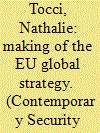

|
|
|
|
|
| Summary/Abstract |
This article traces the evolution of the EU strategic reflection which culminated in the publication of the EU Global Strategy (EUGS) in June 2016. It explains the choices made by EU High Representative Federica Mogherini over this time period—including both the initial strategic assessment and the final EUGS. It provides a behind the scenes view on the players, the organization and the methods of work used to produce a strategic vision for the EU’s role in the world.
|
|
|
|
|
|
|
|
|
|
|
|
|
|
|
|
| 11 |
ID:
148298
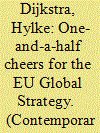

|
|
|
|
|
| Summary/Abstract |
EU High Representative Federica Mogherini presented her EU Global Strategy (EUGS) in June 2016. Encircled by security crises, it is difficult to think of something more important for Europe than collective action with the aim of weathering the storm. The EUGS, in this respect, seeks to define common ends and identify means. So what do we make of the EUGS? What does the EUGS tell us about the current role of the EU in global affairs? And how will the withdrawal of the UK from the EU affect foreign and security policy? As a way of introduction to the forum, this article notes that the EUGS focuses on the neighbourhood, puts the interests of European citizens first, identifies civilian means, and has created momentum on security policy. The key question, however, remains whether there is any interest in the EUGS beyond the foreign policy elites.
|
|
|
|
|
|
|
|
|
|
|
|
|
|
|
|
| 12 |
ID:
163652
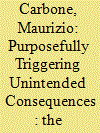

|
|
|
|
|
| Summary/Abstract |
The EU’s proposal to renew the EU-ACP Agreement in spite of a number of signals pointing in the opposite direction is, inter alia, the unintended consequence of independent decisions taken in three different policy areas (trade, environment, and foreign and security affairs). The common unintended consequence that the three decisions shared would not have materialised if the European Commission had not purposefully triggered it to justify its vision of future EU-ACP relations. These findings challenge the prevailing and superficial usage of the notion of the unintended as a synonym for unanticipated and undesirable, and demonstrate that unintended consequences do not necessarily presuppose lack of anticipation, but may well be the result of calculation by policymakers.
|
|
|
|
|
|
|
|
|
|
|
|
|
|
|
|
| 13 |
ID:
171156
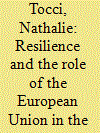

|
|
|
|
|
| Summary/Abstract |
The idea of resilience in EU academia and practice predates the EU Global Strategy. But it is with the 2016 EUGS that resilience was elevated into one of the five guiding principles for the EU’s role in the world. This article recounts the origins of the concept in the context of European foreign policy. Resilience reflected the implicit goal of the EUGS to foster a more joined-up approach to European foreign policy, it epitomized the philosophy of principled pragmatism enshrined in the EUGS, and it captured the transformative approach to complex change advocated by the EU. The implementation of the EUGS over the last three years has been a story of lights and shadows. However, the idea of resilience lives on also and perhaps even more importantly because of its changing interpretation in the European policy debate.
|
|
|
|
|
|
|
|
|
|
|
|
|
|
|
|
| 14 |
ID:
151387
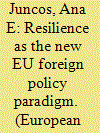

|
|
|
|
|
| Summary/Abstract |
This article examines the rise of resilience discourses in EU foreign policy. The European Union Global Strategy (EUGS) refers to building state and societal resilience in its neighbourhood as one of the key strategic priorities of the EU. This article argues that the discourse of resilience that permeates the EUGS chimes well with a pragmatist turn in social sciences and global governance. The EUGS introduces resilience-building alongside an emphasis on flexibility, tailor-made approaches and the need for local ownership, capacity-building and comprehensiveness. More importantly, the new EUGS proposes “principled pragmatism” as a new operating principle in its foreign policy. While this might suggest a more pragmatic EU foreign policy, a closer examination of the EUGS discourse reveals significant tensions between a pragmatic and a principled foreign policy, which undermine the added value of resilience-building as a new foreign policy paradigm.
|
|
|
|
|
|
|
|
|
|
|
|
|
|
|
|
| 15 |
ID:
171715
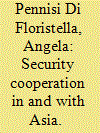

|
|
|
|
|
| Summary/Abstract |
Since the adoption of the first EU-Asia Strategy in 1994, there has been persistent scepticism about the EU’s ability to play a significant role in Asian security. Yet, since the release of the 2012 Updated East Asia Policy Guidelines, the EU has declared its intent to make greater practical contributions to Asian security. Against these premises, this article attempts to reflect on the evolution of the EU’s security approach to Asia, with the ultimate goal of analysing to what degree, it represents a continuation or a departure from former EU policies in the region. In scrutinising these developments, this article argues that in light of the strategic changes, that have occurred in Europe and in Asia, the EU has started to revise its security approach to the region in more pragmatic terms. The pragmatic character of the EU is seen as looking into the changes of the content of the security discourse, which appears increasingly depoliticised and, into the new practices of cooperation, which unlike in the past, seek to empower local actors, are sensitive to local needs and, call for greater security collaboration between the EU and Asian countries, to cope with regional and global challenges.
|
|
|
|
|
|
|
|
|
|
|
|
|
|
|
|
|
|
|
|
|